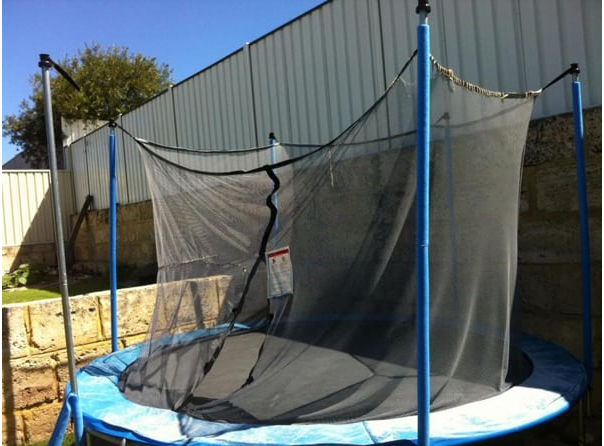Trampoline Parts and accessories in Kenya

Does your trampoline look like the above picture?
It simply means that it’s time to consider buying some replacement parts. Trampolines can be dangerous if they are not properly maintained. Just as we habitually check the brakes on our children’s bikes, we also should take care of our trampoline, ensuring that it is always in a good shape.
The critical areas to consider in trampoline repairs and replacement of parts in Kenya, Uganda and Tanzania are:
The Netting
- Of all areas of a trampoline, this is the part that often fails, yet it is the most vital safety component. The netting can come apart if it is cut or ripped, it can also just rot and fall apart
- Good quality netting will last 5-10 years, therefore when ordering replacement netting, spend as much as you can-the higher the price the netting, the longer it will last
- Look for polyester netting as it is far more durable than nylon
The padding over the frame and springs
- How often you replace this component is influenced by one key consideration: – Does your enclosure netting hang inside or outside the padding? If the netting hangs outside the padding, there is no need for the padding to be in top condition, because the netting will stop the user from coming in to contact with the frame or springs ( the main reason that trampolines has surround pads)
- If the netting hangs inside the padding, as it did on most models manufactured before 2009, the padding needs to be in good condition. If the pads have fallen apart, they will not provide protection should the jumper fall on to the springs or frame
- As with replacement netting, the more you spend on padding the longer it will last. As long as the pads are a decent thickness of 20mm+ they will have plenty of cushioning property, but ensure that the outer covering material is thick too- circa 0.55m. If it’s a thin material such as PE it will crack in direct sunlight, advisable to look for good thick PVC pads
The Jump Mat
- The good news is that 99% of jump masts are made of polypropylene, as such are indestructible. The jumping mat should last at least 10 years, before they perish, however, if they get a cut or slit in them, they will need replacing. Putting a foot through a jump mat and hitting the ground can seriously injure the user
- If your mat gets a hole in it from a cigarette or ember from a bonfire, there is no cause for alarm because the cross-weave nature of a jump mat is such that the hole should not get any larger
The Frame
- The frame does not need replacing, as long as you have bought a genuine one. Most frames are made of fully galvanized steel, meaning that they will not rust or crack
- Always check the frame on a weekly basis because it is under tension, and if there is a fault in the steel, you do not want to have the frame collapsing on you
The springs
- Springs usually break either because they are not strong enough for the job (they vary in quality), or the trampoline weight limit has been exceeded
- A bit of surface rust is not a problem and if only missing a couple of springs, the quality of the bounce and safety should not be compromised in the short term
- Missing quite a few springs means that the bounce will not be as good as it should be, but more importantly, you are not spreading the load correctly across the remaining springs. This means that here is an obvious safety issue and in time, the rest of the springs will fail too


